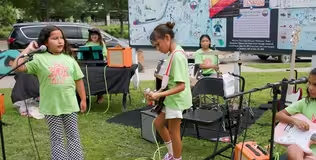
Scammers siphon college financial aid with stolen identities
Clip: 8/24/2025 | 5m 31sVideo has Closed Captions
How scammers are siphoning college financial aid with stolen student identities
According to recent reports, sophisticated criminal networks are using identity theft to disguise themselves as students at U.S. colleges. They flood colleges with applications in order to siphon off tens of millions of dollars in financial aid, taking up seats that real students need. Ali Rogin speaks with Fortune editor Amanda Gerut to learn more about this growing scam.
Problems playing video? | Closed Captioning Feedback
Problems playing video? | Closed Captioning Feedback
Major corporate funding for the PBS News Hour is provided by BDO, BNSF, Consumer Cellular, American Cruise Lines, and Raymond James. Funding for the PBS NewsHour Weekend is provided by...

Scammers siphon college financial aid with stolen identities
Clip: 8/24/2025 | 5m 31sVideo has Closed Captions
According to recent reports, sophisticated criminal networks are using identity theft to disguise themselves as students at U.S. colleges. They flood colleges with applications in order to siphon off tens of millions of dollars in financial aid, taking up seats that real students need. Ali Rogin speaks with Fortune editor Amanda Gerut to learn more about this growing scam.
Problems playing video? | Closed Captioning Feedback
How to Watch PBS News Hour
PBS News Hour is available to stream on pbs.org and the free PBS App, available on iPhone, Apple TV, Android TV, Android smartphones, Amazon Fire TV, Amazon Fire Tablet, Roku, Samsung Smart TV, and Vizio.
Providing Support for PBS.org
Learn Moreabout PBS online sponsorshipJOHN YANG: There's a rising threat U.S. colleges have to deal with.
Sophisticated criminal networks are using identity theft to disguise themselves as students.
They flood colleges with applications in order to siphon off tens of millions of dollars in financial aid.
What's more, they're taking up seats that real students need.
A series of recent reports reveal that these so called ghost students even go as far as turning in homework assignments so they don't get dropped from classes.
As colleges are set to begin a new academic year, Ali Rogan spoke with Amanda Gerut of Fortune, who's been reporting on this growing scam.
ALI ROGIN: Amanda, thanks so much for joining us.
Let's start with the basic question, which is what are ghost students and how do they operate?
AMANDA GERUT, West Coast Editor, Fortune: So go students are masses of synthetic or fake identities and they're used by these sophisticated criminal networks to flood college application and enrollment systems.
These are sophisticated fraud rings operating some overseas in places like Pakistan, Bangladesh, Vietnam.
And they are swarming community college systems.
They are applying, enrolling and getting into classes and requesting financial aid.
Sometimes it's a revenue generation scheme.
It's just about making money.
Other times it's about getting that dot edu email address.
And that email address, if you're a scammer, is like a gold bar.
You look like a legitimate college student and you can get discounts on laptops, software, streaming services.
And fraudsters want a piece of that action.
ALI ROGIN: And the financial element for those that are operating strictly out of a profit motive, how does that work?
They're getting, is that right?
AMANDA GERUT: They're applying for financial aid, applying for student loans, and they're using usually stolen identities to do so.
So the victims are not just the colleges themselves, but people who have nothing to do with it.
So people are having their identities stolen and then they're having financial aid taken out in their names.
ALI ROGIN: And what do we know right now about the scale of this problem?
AMANDA GERUT: The scale of the problem is really difficult to put your arms around because these scammers are stealing legitimate people's identities.
So it usually takes a person noticing that someone has taken out a student loan in their name.
So right now the Department of Education has identified $150 million that's been dispersed to ineligible students and $30 million of that went to people who were dead who had their identities stolen.
And then we know, like in California, community colleges have been hit by very hard.
But it's not just a California problem.
Michigan, Minnesota, Oregon, New Jersey, some of the largest districts are vulnerable to this.
And then some of the super small rural community colleges are also being hit.
ALI ROGIN: Why is it that these rings are targeting those schools as opposed to four year universities that might have more money?
AMANDA GERUT: So community colleges are so vulnerable to this because they are meant to be open access institutions.
You can take a class whenever you want at a very affordable price.
They're meant to be a community resource.
And so they're open.
And they're also typically required by statute to accept any eligible student.
So fraudsters know that and they're exploiting that by the way that they're flooding those systems.
ALI ROGIN: And certainly the people whose identities are being stolen are losing money.
But there's also a downside for the students and for the teachers that are legitimately trying to operate within the community college system.
AMANDA GERUT: Okay, so for real students, every dollar that goes to a go student is one less dollar for a legitimate student.
So, real students are losing out on the opportunity to get financial aid to pay for their classes.
They're locked out of classes that they need to graduate, delaying their plans to graduate.
They're locked out of courses they've planned to take.
And then for teachers and faculty, there's excitement over your class suddenly being full to the brim.
Maybe you need to add new sections.
And then nobody shows up on the first day.
So you have this wasted time, all this wasted energy going towards these AI generated ghost students when, you know, all the energy at a community college is typically focused on getting people educated.
ALI ROGIN: And the community colleges are the ones responsible for making sure that the students that are registered are in fact human when they go and ask the state for money.
So what burden remains on these colleges?
And what does that look like?
AMANDA GERUT: Right now, they're doing hand to hand combat right now.
Some of them are doing manual application reviews.
They're asking students to go to a notary to verify their identity.
They're asking them to come in.
And the more barriers that you put in front of students to getting educated, the less able they are to access those resources.
So that's part of the pain point here, is how much friction do you put in the system for, you know, making people able to get into community college.
ALI ROGIN: Amanda Gerut with Fortune.
Thank you so much.
AMANDA GERUT: Thank you for having me.
3 brothers attempt a record-setting row across the Pacific
Video has Closed Captions
Clip: 8/24/2025 | 8m 51s | Why three brothers are attempting a record-setting row across the Pacific Ocean (8m 51s)
Rock The Rez brings empowerment and glam to Indigenous kids
Video has Closed Captions
Clip: 8/24/2025 | 6m 5s | Rock The Rez brings musical empowerment and glam to Indigenous kids (6m 5s)
Providing Support for PBS.org
Learn Moreabout PBS online sponsorship
- News and Public Affairs

FRONTLINE is investigative journalism that questions, explains and changes our world.

- News and Public Affairs

Amanpour and Company features conversations with leaders and decision makers.












Support for PBS provided by:
Major corporate funding for the PBS News Hour is provided by BDO, BNSF, Consumer Cellular, American Cruise Lines, and Raymond James. Funding for the PBS NewsHour Weekend is provided by...

